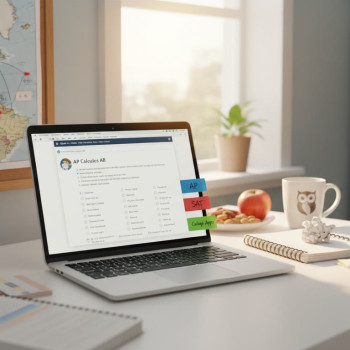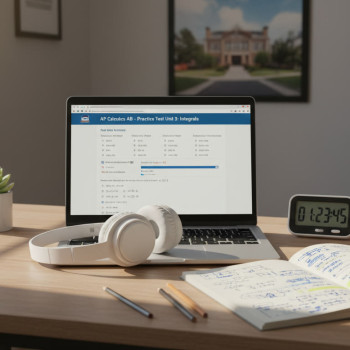Introduction: Why This Bridge Matters
Switching from the ICSE curriculum to College Board Advanced Placement (AP) Quantitative and Science courses is an exciting move — and a strategic one. AP courses can strengthen university applications, sharpen critical thinking, and provide college-level challenge in high school. But the two systems use different emphases, structures, and assessment styles. If you’re an ICSE student (or a parent guiding one), this article maps a clear, calm path from your current strengths to confident AP performance.
Big Picture: Differences and Similarities
Before we dive into study plans and schedules, it helps to see the landscape. ICSE offers rigorous foundations in mathematics, physics, chemistry, and biology with a strong focus on problem-solving and rote mastery of core content. AP builds on that foundation but adds college-style depth: conceptual reasoning, formal problem sets, experimental design, and, in many courses, free-response analytical writing.
Core similarities
- Both emphasize conceptual understanding and procedural fluency.
- Laboratory and empirical thinking are central to science courses.
- Knowledge from ICSE will often transfer directly; you’re not starting from scratch.
Core differences
- AP exams test application in new contexts, often with multi-step reasoning and explanation components.
- AP Quant courses (like AP Calculus AB/BC or AP Statistics) assume familiarity with limits, derivatives, integrals, or statistical thinking and interpretation at a faster pace.
- AP science labs focus on inquiry and design — interpreting experimental data and connecting methods to conclusions.
Which AP Courses Make Sense for ICSE Students?
Not every AP course is an obvious match for ICSE students — and that’s fine. Choose based on current strengths, future interests (engineering, medicine, economics), and timeline.
AP Calculus AB/BC
If you’ve completed ICSE Class 10 and Class 12 math topics with comfort in algebra, trigonometry, and introductory functions, AP Calculus AB is a natural next step. AB covers foundational differential and integral calculus; BC covers AB topics plus sequences, series, and additional integration techniques.
AP Statistics
For students who enjoyed probability and data discussions in ICSE, AP Statistics is highly accessible and practically valuable across social sciences, engineering, and business majors. It emphasizes interpretation over heavy symbolic manipulation.
AP Physics (1, 2, C)
AP Physics 1 and 2 are algebra-based and map well if you have a strong ICSE physics background. AP Physics C (Mechanics and Electricity & Magnetism) is calculus-based — choose it if you’re taking or plan to take Calculus concurrently.
AP Chemistry and AP Biology
ICSE students who excelled in chemistry and biology will find AP Chemistry and AP Biology demanding but familiar. AP Chemistry requires strong problem solving, often at a quantitative level. AP Biology leans on conceptual understanding, reading comprehension of passages, and experimental reasoning.
Where to Start: A Step-by-Step Onramp
Here’s a practical sequence to go from deciding to commit to AP through exam readiness.
Step 1 — Self-audit (2–4 weeks)
List the ICSE topics you know well and the areas where you feel shaky. For math: algebraic manipulation, functions, trigonometry, coordinate geometry. For sciences: core laws, laboratory vocabulary, chemical equations, biological processes. Be honest — this audit will guide your plan.
Step 2 — Choose the right AP target (1 week)
Pick 1–2 AP courses to begin with. If you’re new to AP-style assessments, start with one (for example, AP Calculus AB or AP Physics 1). If you’re naturally ambitious and have strong support, a second AP in a related field can work — for instance, AP Calculus and AP Physics C.
Step 3 — Map ICSE topics to AP expectations (2–3 weeks)
Create a topic map showing where your ICSE knowledge aligns with AP syllabus standards. This helps spot gaps early — for example, sequences and series may be covered lightly in ICSE but are tested in AP Calculus BC.
Step 4 — Build a 6–9 month study plan
AP success is often about consistent, deep practice rather than last-minute cramming. Design a plan with weekly milestones, mixed practice (multiple-choice and free-response), periodic full-length practice exams, and time for lab or project-based practice for science courses.
Example 9-Month Timeline (If you plan to take the AP exam in May)
| Month | Focus | Key Activities |
|---|---|---|
| Months 1–2 | Foundation | Self-audit, topic mapping, strengthen algebra/trig, review fundamental lab techniques. |
| Months 3–4 | Core Content | Complete core syllabus topics, daily problem sets, begin short-form practice FRQs. |
| Months 5–6 | Application | Timed sections, mixed-topic problem sets, experimental design practice, start full practice tests. |
| Months 7–8 | Refinement | Analyze mistakes, targeted review, focus on weak units, tutoring or extra workshops. |
| Month 9 | Polish & Rest | Final practice exams under test conditions, light review, mental prep, sleep and routine. |
Study Strategies That Work: Beyond Doing Lots of Problems
Quantity of practice matters, but quality matters more. Use active strategies designed for AP success.
1. Deliberate practice with feedback
Do problems that target one skill at a time. For example, spend a session only on free-response questions that require explaining experimental results, then get detailed feedback. If you’re using a tutor or Sparkl’s personalized tutoring, ask for targeted corrections and worked solutions that explain both the ‘how’ and the ‘why’.
2. Embrace free-response early
MCQs are comforting, but FRQs expose thinking gaps. Practice short, clear written answers regularly. For science subjects, practice explaining graphs, drawing labelled diagrams, and justifying conclusions from data.
3. Build a lab mindset
AP science emphasizes experimental reasoning: hypotheses, controlled variables, error analysis, and interpretation. Even if you study at home, simulate experiments mentally: how would you test a claim? What data would be convincing?
4. Connect math to real problems
In AP Quant courses, the math has context. Reinforce symbolic fluency by translating word problems into equations and back again. If you’re studying for Calculus, practice interpreting derivatives and integrals in physics and biology settings.
A Sample Weekly Study Template (for a Busy Student)
- Monday — 60 minutes: Core content review (lecture notes + worked examples).
- Tuesday — 60 minutes: Problem set (targeted topic), 15 minutes reflection on errors.
- Wednesday — 45 minutes: Lab/experiment conceptual practice or data interpretation.
- Thursday — 60 minutes: Free-response practice (timed, then review).
- Friday — 30 minutes: Quick quiz (mix of MCQs) and summary notes.
- Weekend — 2–3 hours: Full-length practice or deeper concept study; one day for rest.
How Parents Can Support Without Taking Over
Parents are vital to motivation, scheduling, and emotional balance — but the student must own the learning. Here’s how to help effectively:
- Help create and protect a consistent study schedule.
- Provide resources (books, a quiet study space, access to practice materials).
- Encourage reflection over hours — ask what was learned that week rather than how many hours were logged.
- Find targeted support when needed: a tutor, weekend workshops, or a study group.
Where Tutoring Helps Most (and When to Use It)
Tutors accelerate progress by diagnosing gaps and delivering focused instruction. Consider Sparkl’s personalized tutoring when you need:
- One-on-one guidance to convert ICSE strengths into AP strategies.
- Tailored study plans that fit school load and exam timelines.
- Expert tutors who can model AP-style reasoning and review practice exams.
- AI-driven insights for targeted practice and progress tracking.
Small, focused tutoring sessions often beat broad classes because they adapt to exactly where the student needs that week.
Examples: Topic Conversion from ICSE to AP
Here are concrete examples of how common ICSE topics translate into AP expectations.
| ICSE Topic | AP Counterpart | Study Tip |
|---|---|---|
| Trigonometry and identities | Functions and derivatives in calculus; trigonometric integrals | Practice manipulating identities quickly; connect trig graphs to function behavior in calculus. |
| Stoichiometry and reaction balancing | Quantitative problem solving in AP Chemistry | Work multiple quantitative problems and learn to explain each computational step. |
| Experimental write-ups with observations | AP lab reports and investigation-based FRQs | Practice structuring claims, evidence, and reasoning (CER) for each lab. |
| Probability basics | AP Statistics inference and interpretation | Focus on interpretation: what does a p-value or confidence interval mean in plain terms? |
Practice Exams: How to Use Them Effectively
Practice exams are the single-best diagnostic tool when used thoughtfully.
Do them under test conditions
Simulate timing, quiet, and breaks. This trains stamina and timing strategies.
Score, but then analyze deeply
Don’t just record your score. For each missed item write: What concept was tested? Why did I miss it? How will I avoid this mistake next time? This short reflection closes the learning loop.
Rotate between full tests and focused mini-tests
Full tests every 4–6 weeks, but weekly mini-tests on weak topics keep progress steady.
Mindset and Wellness: The Often-Overlooked Exam Prep Ingredients
AP success is partly academic and partly psychological. Maintain steady sleep, nutrition, and regular movement. Short meditation or breathing exercises before intense study blocks increase focus. When anxiety spikes, return to the basics: a small win (a single solved problem or a clear paragraph) rebuilds confidence.
Common Mistakes ICSE Students Make — and How to Avoid Them
- Underestimating FRQs: Practice them early.
- Rote memorization instead of conceptual framing: Always ask ‘why’.
- Neglecting experimental design: Spend time explaining experiments aloud or on paper.
- Poor time management on exam day: practice pacing in full-length tests.
Success Stories: Small Wins That Add Up
Students I’ve worked with often report the same pattern: an initial period of feeling overwhelmed, followed by a breakthrough after 6–8 weeks of focused, feedback-rich practice. One student transitioned from ICSE Chemistry to AP Chemistry by dedicating three weekly sessions to quantitative problem sets and two sessions to lab-writeup practice. Within a term they were not only solving equations faster but writing clearer, more persuasive lab explanations.

When to Consider Taking the Exam
AP exams are offered each May. Ideally, schedule your preparation so that you have completed most of the syllabus and several full practice exams a month before the test. If your school offers an AP class, use it — but complement it with targeted tutoring for the specific skill areas that AP emphasizes: free response clarity, lab reasoning, and cross-topic synthesis.
Final Checklist Before Test Day
- Complete at least two full-length practice exams under timed conditions in the last 6 weeks.
- Polished set of formula/quick-reference notes (for study only — not allowed in exam).
- Review a list of common experimental setups and how to analyze their data.
- Practice a short cold-start FRQ the morning of to wake analytical muscles (no heavy studying).
- Pack test essentials the night before and plan your travel time so you arrive calm.
Closing Thoughts: Make the Bridge Purposeful and Joyful
Moving from ICSE Math and Science to AP Quant and Science is more marathon than sprint. Your ICSE background gives you a strong platform — use it to focus on AP’s emphasis on reasoning, explanation, and experimental thinking. Keep practice purposeful, get feedback early, and let small wins fuel confidence. If personalized support would help, consider short bursts of one-on-one coaching; services like Sparkl’s personalized tutoring can provide tailored study plans, expert tutors, and AI-driven insights to identify and close gaps quickly.
Above all, remember this: AP courses are an opportunity to explore subjects deeply and demonstrate the kind of thinking colleges value. Pace yourself, stay curious, and celebrate progress — every clear explanation you write and every experiment you analyze is a step toward mastery.

Need a Starting Plan?
If you’d like, I can draft a customized 12-week study plan for one AP course (Calculus AB, Physics 1, Chemistry, or Statistics) based on your current ICSE level and weekly availability. Tell me the course and how many hours per week you can commit, and I’ll create a week-by-week roadmap.















No Comments
Leave a comment Cancel